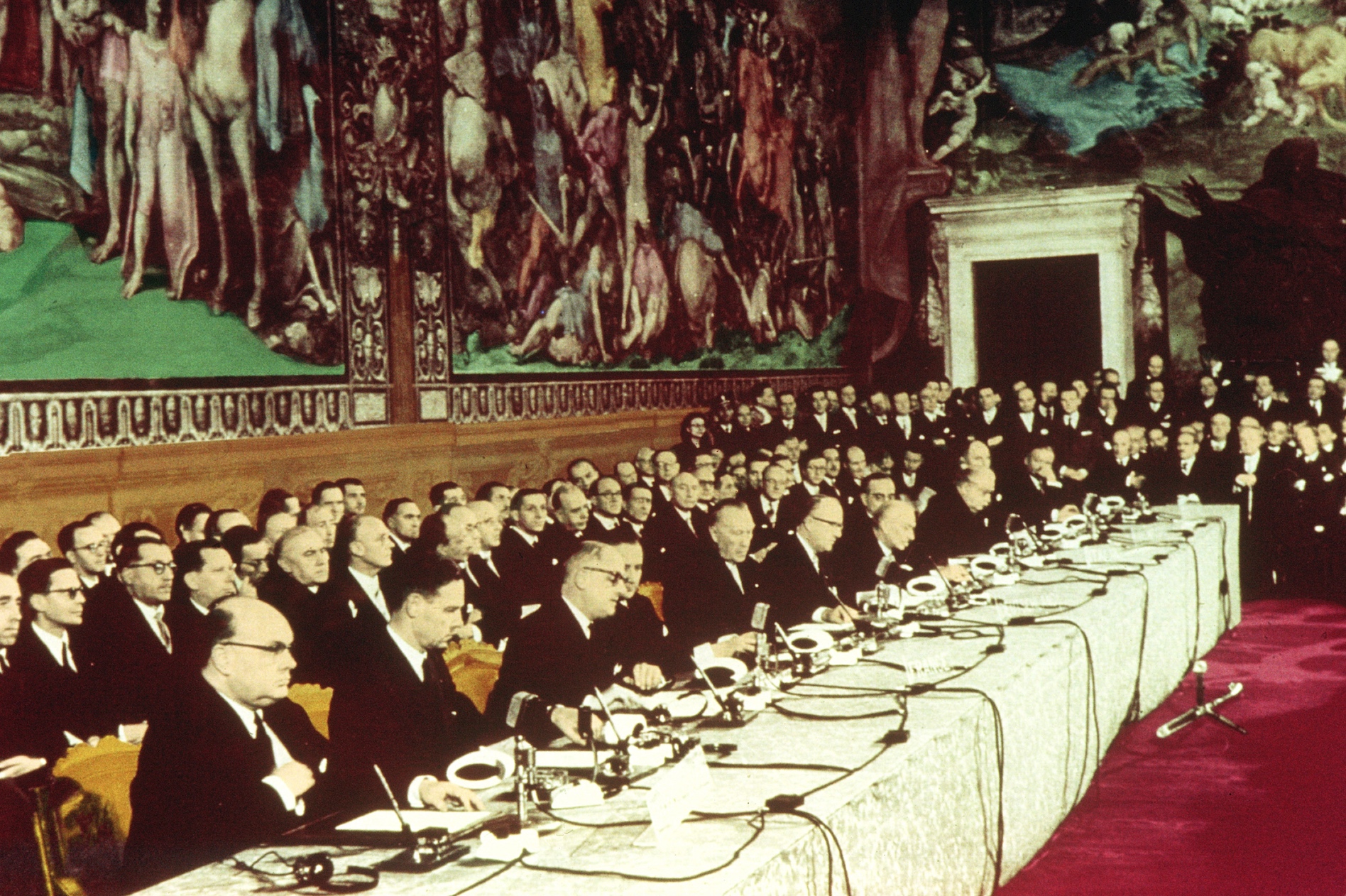EEC treaty
The preamble stresses the importance of strengthening Europe’s international stance after the EDC failure and the rise of international tensions.
The preamble stresses the importance of strengthening Europe’s international stance after the EDC failure and the rise of international tensions.
As relevant to the European process of integration, the late 1950s witnessed two main events: the failure of the EDC and the rise of international tensions. Both events showed how the ECSC was perceived less as an international player thanas a mere observer in the clash between two global powers: US and URSS.
First, following the Korean War, the successes of the communist order seemed to be calling for Germany’s rearmament[10]. This was still impossible, nonetheless, due to the Treaty of Versailles, prohibiting Germany from constituting an independent army[10]. Therefore, member states proposed the introduction of a new treaty, establishing a European Defence Community (EDC)[10]. In August 1954, however, the French National Assembly refused to ratify the treaty, thereby blocking its promulgation[10].
Second, in 1956, international tensions rapidly rose due to the Suez Crisis and the Hungarian crisis[11]. Following the former, both URSS and US accused France and the UK of neo-colonialism, raising tensions with Europe[11]. As for the latter, the intervention of Soviet troops in Budapest highlighted the political weakness of the ECSC, clearly unable to stop the URSS from invading an area so close to its boundaries[11].

The Cold War: USA vs URSS [4]

Signing of the treaty of Rome (EEC and EURATOM) [5]
In light of rising international tensions and the recent failures at furthering European integration, in July 1955, Belgian Foreign Minister Paul-Henri Spaak started working to strengthen, rather than complement, the system introduced by the ECSC treaty[8]. In order to shift its framework from a sectoral approach to an ensemble, thus, he proposed to expand European economic cooperation beyond the coal and steel markets[8]. On 25th March 1957, a treaty establishing the European Economic Community (EEC) was signed by Belgium, France, Italy, Luxembourg, Netherlands and West Germany.
The treaty established a common market and introduced shared policies in strategic fields (specifically agriculture, transport and trade) [12].
Following the failure of direct political integration (EDC) and the rise of international tensions, the preamble stresses the importance of strengthening Europe’s international stance through economic integration, as guaranteed by a new supranational organisation. This is presented as a crucial step to "establish the foundations of an ever-closer union among the European peoples"[13].
The main focus of the EEC preamble is thus on socio-economic development, rather than peace. More specifically, the main goal is claimed to be harmonious and fair economic progress, improving European living standards and reducing economic inequality. This is meant to be achieved through steady expansion, balanced trade and fair competition, as guaranteed by common commercial policies and the abolishment of trade restrictions.
In addition, the preamble stresses the importance of respecting certain key political principles, as well as maintaining peace. It is resolved, in particular, to "preserve and strengthen [..] liberty”[13], by respecting the principles of the Charter of the United Nations.
When compared to the ECSC treaty, then, the EEC one places a stronger focus on the international dimension, not only making direct reference to the Charter of the United Nations, but also affirming the importance of the "solidarity which binds Europe"[13] and aiming to "contribute [..] to the progressive abolition of restrictions on international trade"[13].
Last but not least, when compared to the EDC preamble, the EEC one presents a key difference. The former had put far a greater stress on a form of political integration reliant on supranational entities, claiming that "an integration [...] of the human and material elements [...] within a supranational European organisation is the most appropriate means of researching this goal with all the necessary rapidity and effectiveness”[14]. Indeed, even though the EEC represents a fundamental step in terms of economic integration, it puts lower stress on the ideas of integration and shifting loyalties to a supranational entity.

The EEC preamble [6]